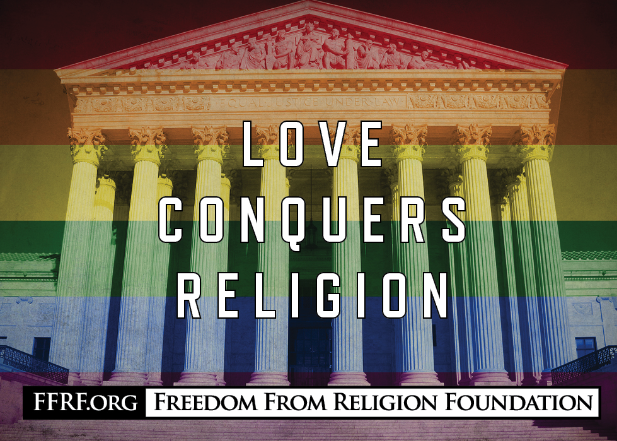
The Freedom From Religion Foundation is asking its members to urge their U.S. senators to vote in favor of codifying same sex and interracial marriage. The Respect for Marriage Act (HR 8404) passed the House of Representatives and is now before the Senate with a vote expected to take place as soon as this week. FFRF is pleased that Congress is taking action to codify the basic right to marry.
The U.S. Supreme Court has proven itself incapable of abandoning personal beliefs in its rulings. Ignoring all precedent, the court has forced Congress to ensure that all residents of this country have equal rights to marry. Despite the majority opinion in the Dobbs ruling demurring that its decision to ignore privacy rights protections with abortion rights did not endanger similar rights, the Obergefell ruling (sanctioning marriage equality) or even the Loving decision legalizing interracial marriage are potentially jeopardized. Justice Clarence Thomas’ concurring opinion in Dobbs made this crystal clear.
Codifying these basic rights is overdue. Public support for same-sex marriage has reached an all-time high. More than seven in 10 American adults believe that same-sex marriages should be considered valid and have the same recognition as “traditional” marriages. Unsurprisingly, the support for interracial marriages is higher. As astounding as it is that these rights could even be up for debate today, the Senate must do what’s right and finally pass HR 8404.
While FFRF supports the bill’s purpose to codify same-sex marriage and protect interracial marriage, it’s important to point out that the bill was watered down to cater to theocratic-minded senators. To secure the votes to pass the bill, Senate sponsors reached a compromise to allow for “religious exemptions.” Senate Amendment 6480 states that nothing in the bill should be understood to “diminish or abrogate a religious liberty or conscience protection otherwise available to an individual or organization under the Constitution of the United States or Federal law.” After the amendment was announced, the Mormon Church surprised most of us by expressing its support for the legislation. Deeming the amended legislation as “the way forward,” the church was quick to note that its official belief would remain that “marriage is between one man and one woman.”
There is no actual need for a “religious exemption,” because churches and ministers are already free to refuse to perform same-sex marriages, to adopt their own rules and policies on performing marriages. No one, including heterosexual couples, has the right to march into a church and demand to be married in that church or by that church’s pastor. The Obergefell decision could only mandate that the government and states must recognize the validity of same-sex marriage.
What the “compromise” does show, however, is the hateful position of many evangelical and other religious lobbies, such as the vociferously homophobic U.S. Conference of Catholic Bishops, which hasn’t budged on its discriminatory dogmas. Such groups demand the right to discriminate — and that should be considered anathema.
FFRF is also dismayed that the same senators who are poised to pass the Respect for Marriage Act will not go to bat for reproductive rights. The Women’s Health Protection Act, which would codify the provisions Roe v. Wade used to protect, likewise passed the House, but is considered dead in the Senate. How can the Senate cavalierly and cruelly refuse to act on this vital question of bodily autonomy: the right to decide if, when and whether to become a mother or parent, and the right to end an unwanted pregnancy?
The Respect for Marriage Act is a crucial step toward marriage equality. We ask our members to continue to contact their senators until a final vote has been taken on the matter. FFRF will continue its fight to uphold the constitutional separation between state and church, and to educate the public about nontheism. Codifying the right to marry for all is a step in the right direction and should be celebrated as such.